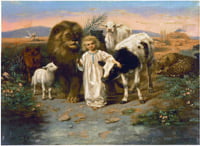Abraham had Isaac, and Isaac had Jacob. Jacob had 12 sons who would become the nation of Israel. Jacob was dying and gave a blessing to each of his sons. In his final blessing upon his son Judah, Jacob began by describing him as a warrior and a lion. He ends with the following: Genesis 49:10: “The scepter shall not depart from Judah, nor the ruler’s staff from between his feet, until Shiloh comes, and to him shall be the obedience of the peoples.”
Shiloh was a town in the tribe of Ephraim, and the Ark of the Covenant was there for a time. But this isn’t referring to a place.
“Until Shiloh comes” is a bit difficult to understand. The likely Aramaic meaning is “until he comes whose the scepter is.” The one who has authority, the one to whom the scepter belongs, will come. Until then, it will stay with Judah.
We understand Shiloh to represent Jesus. This is a prophecy which began its fulfillment at Jesus’ first advent continues progressively through this present age into the establishment of Christ’s righteous reign on earth.
With a scepter showing the right to rule and a ruler’s staff in Hebrew meaning “lawgiver,” we think of words like royal, authoritative lawgiver, deserving ruler, profoundly respected. These are descriptive qualities of the Messiah.
Here is another prophecy regarding Israel suffering consequences for their sins, and yet it has one line of GREAT hope which verifies Shiloh:
Ezekiel 21:27: (KJV) I will overturn, overturn, overturn it: and it shall be no more, until he come whose right it is; and I will give it him.
(Source: Ellicott’s Commentary for English Readers) “until he come whose right it is” – generally acknowledged as a reference to Genesis 49:10, “Until Shiloh comes.”
(Source: Cambridge Bible for Schools and Colleges Commentary) It might be shelloh meaning ‘whose’; not Shiloh as a proper name.
Revelation 5:5 identifies our risen Lord as the ruler from the tribe of Judah, “the Lion that is from the tribe of Judah, the Root of David.”
Thus, the prophecy of Genesis 49:10 foretells that Shiloh (Jesus) will come from Judah, will be given the power and right to reign, and all people will obey him (during God’s kingdom). Isaiah 9:7 (NASB), “There will be no end to the increase of his government or of peace, on the throne of David and over his kingdom, to establish it and to uphold it with justice and righteousness from then on and forevermore.”
Additional Resource:
Christian Questions Podcast
Episode #1312: “How Do We Know Jesus Is the Promised Messiah? (Part I)”
Jewish skepticism and key Old Testament identifiers of the Messiah
Preview Video
CQ Rewind Show Notes












